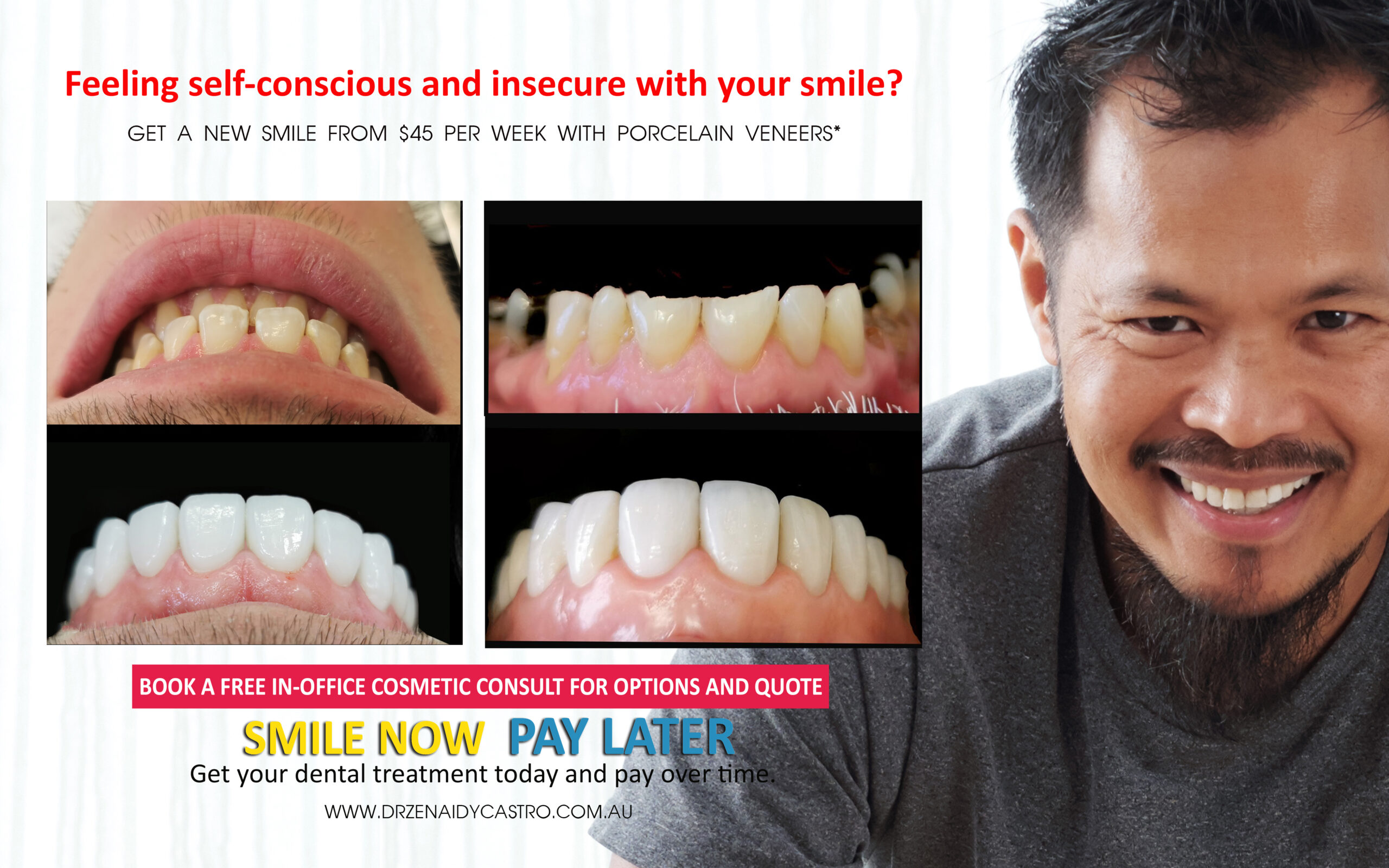THE HIDDEN STRUGGLE: WHY MENTAL HEALTH AND DENTAL COSTS ARE CONNECTED
Coping with Dental Anxiety & Stress from Treatment Cost
For many Australians, financial stress is not just a background worry—it’s a daily reality that influences every decision, including the decision to seek dental care. When living paycheck to paycheck or facing economic uncertainty, oral health is often pushed to the bottom of the priority list. Unlike a broken bone or a high fever, a toothache may seem like something you can endure “just a little longer,” especially when the idea of an expensive dental bill looms in your mind. Yet, what begins as a minor issue often turns into a major problem, and the financial burden of delayed care can become significantly greater than if it had been addressed early. Unfortunately, this is a scenario we see often in clinics across Melbourne CBD and Noble Park North: patients who’ve endured months or even years of avoidable discomfort because they feared the financial impact more than the physical pain.
This fear is understandable. Dental care in Australia is not typically subsidized in the same way as general healthcare, and while there are public dental options available, the wait times can be long and the services limited. For those without private health insurance, the out-of-pocket costs can be daunting. Even individuals with insurance may find that coverage falls short when it comes to major procedures like crowns, implants, or full mouth rehabilitation. The sticker shock of a treatment plan can feel like a punch to the gut, especially when you’re already managing rent, bills, food, and perhaps the financial demands of raising a family. It’s no surprise, then, that many people try to cope with the discomfort on their own—relying on painkillers, home remedies, or emergency visits to their GP for temporary relief. While these stopgap measures may buy time, they don’t resolve the underlying problem.
In the long run, trying to save money by avoiding the dentist often ends up costing more. A simple filling left untreated may become a root canal or an extraction. A cracked tooth might turn into a full replacement. The cost of dental emergencies—often thousands of dollars more than routine care—can escalate rapidly. More importantly, the longer someone delays, the more likely they are to face compounded emotional consequences: guilt for having waited, fear of judgment, and overwhelming anxiety about where to even begin. This emotional toll is real, and it exacerbates the financial strain, making the problem feel impossible to solve.
But here’s the good news: there are more resources and options today than ever before to help patients manage the cost of dental care. Clinics like Vogue Smiles Melbourne are committed to providing compassionate, affordable treatment plans tailored to each person’s situation. One of the most popular options is interest-free payment plans. These allow patients to divide the total cost of their treatment into manageable monthly payments—sometimes as little as a few dollars per day. This flexibility removes the pressure of having to pay everything upfront and gives patients a chance to receive the care they need without jeopardizing their financial stability.
Another important financial support mechanism is SuperCare, a service that assists patients in accessing their superannuation early to fund major dental procedures. Many Australians are unaware that superannuation can be used for medical and dental treatment in cases of chronic pain, emergency, or significant health impact. SuperCare handles the paperwork and facilitates the process, offering patients a lifeline when conventional payment methods aren’t viable. This has been especially helpful for patients needing full mouth reconstruction, wisdom tooth removal, or implant-supported dentures—procedures that otherwise would have been financially out of reach.
Private health funds can also alleviate some of the cost burden, particularly for routine treatments like check-ups, cleanings, x-rays, and simple fillings. While coverage may vary, many funds offer yearly rebates that, when used strategically, can significantly offset preventive care costs. Some patients find value in combining insurance benefits with staged treatment plans, where their care is spread out over months or even a year to align with available insurance limits. This approach allows patients to make the most of their coverage while avoiding large one-off payments.
Still, the best way to reduce the cost of dental care is through prevention. Regular check-ups and cleanings may seem like another expense, but they are an investment that prevents more serious and expensive problems down the line. Early detection of decay or gum disease enables dentists to intervene when the solution is still simple and affordable. Preventive care also builds trust between patient and provider, which is vital when financial decisions are involved. When you feel safe, respected, and heard, you’re more likely to return for follow-up appointments and keep your oral health on track.
Equally important is transparent communication. A supportive dental team will always provide a clear treatment plan with itemized costs and walk you through your options. There should be no pressure to say yes immediately. Patients deserve time to digest the information, ask questions, and explore what works best for their budget. If a particular treatment feels out of reach, alternatives should be discussed. Dentistry is not a one-size-fits-all solution, and there are often multiple ways to achieve the same health outcome at different price points.
It’s also worth addressing the emotional impact of financial stress. Shame and fear are powerful emotions, and they can keep people from seeking help. But the truth is, most dentists genuinely want to help. We understand that money is tight for many families right now. At Vogue Smiles Melbourne, we meet people where they are—with empathy, not judgment. Whether you can pay in full, need a payment plan, or require time to explore funding options, we’ll work with you to find a path forward. What matters most is your willingness to take that first step.
Ultimately, tackling financial stress in dental care is not just about money—it’s about mindset. It’s about recognizing that you deserve to be pain-free, to smile confidently, to eat comfortably, and to live without fear of an unexpected dental crisis. It’s about understanding that help exists, and that there are people ready to support you—financially, emotionally, and clinically. You don’t need to have it all figured out. You just need to start. And once you do, you’ll likely find that the burden feels a little lighter, the options clearer, and the path forward less intimidating.
CALMING YOUR NERVES: MENTAL HEALTH TIPS FOR DENTAL VISITS
- Dental visits don’t have to be scary
- Practice slow, deep breathing to calm your nervous system.
- Listen to calming music or use headphones in the chair.
- Let your dentist know your fears—they can pause or adjust treatment.
- Use visualization or grounding techniques to reduce anxiety.
- Bring a trusted friend or family member for support.
When fear meets financial pressure
When fear meets financial pressure, it creates a powerful emotional storm that can leave individuals feeling stuck, helpless, and ashamed. For many, the idea of visiting the dentist isn’t just about the potential discomfort of the treatment itself—it’s about the overwhelming fear of how they’ll be perceived, how they’ll cope emotionally, and, perhaps most frightening of all, how they’ll pay for it. Dental anxiety and financial stress often go hand-in-hand, creating a loop that’s difficult to break. Someone might be scared of pain, scared of judgment, and scared of the cost—all at once. These fears don’t just affect the way a person thinks. They affect how a person lives. The decision to postpone care becomes not a matter of convenience, but one of emotional and financial survival.
Many people suffering from tooth pain or oral health issues don’t avoid the dentist because they don’t care. They avoid the dentist because they’re afraid—afraid of being told they waited too long, afraid the cost will be beyond their reach, or afraid they won’t be able to handle the emotional vulnerability that often comes with sitting in that chair. When life already feels out of control—due to job loss, health challenges, family responsibilities, or trauma—the additional burden of dental care can feel like the final straw. The cost of treatment can be intimidating, especially when it is unexpected and urgent. People often weigh their need for treatment against their rent, groceries, or school fees. And too often, their health loses.
This is not a reflection of poor priorities. It’s a reflection of how deeply intertwined health, emotions, and economics are. The emotional toll of dental avoidance grows over time. What starts as a small twinge or sensitivity becomes a throbbing infection. A cracked tooth becomes an extraction. A missed cleaning becomes gum disease. And with each day that passes, so does the mounting dread. The longer people delay, the more complex and expensive their care becomes—which only reinforces their fear. It’s a vicious cycle. And it plays out silently, in households and hearts, across communities every day.
Some people turn to self-management, using over-the-counter pain relief, home remedies, or emergency GP visits to get antibiotics. These can offer temporary relief but rarely solve the underlying dental issue. When the pain returns—often worse than before—so does the fear, only now with added guilt for having waited. They may blame themselves for not acting sooner, adding emotional pain to their physical discomfort. The idea of going to the dentist begins to feel impossible. They imagine judgment, lectures, or being turned away because they can’t pay in full. In truth, the barrier isn’t just financial. It’s emotional. And it’s real.
We have seen this firsthand at Vogue Smiles Melbourne. Patients who walk through our doors after ten, fifteen, or even twenty years of avoiding care often carry heavy emotional burdens. They feel ashamed, embarrassed, and sometimes even undeserving of help. But their courage in coming forward is profound. These are not people who don’t care about their health. These are people who have battled fear and hardship, and still chose to try again. And every one of them deserves to be met with respect, gentleness, and compassion.
The good news is, more support exists now than ever before. Financing options such as interest-free payment plans or staged treatment allow patients to receive urgent care while spreading out the cost. Programs like SuperCare help eligible Australians access their superannuation for essential dental treatment—often a lifesaver for those facing major work like implants, extractions, or full-mouth rehabilitation. Telehealth options also allow nervous or cost-conscious patients to begin the conversation without commitment. It’s a starting point. And for many, that’s the hardest part.
Dentistry, at its best, should not just be about repairing teeth—it should be about restoring dignity, trust, and quality of life. It should empower people to take ownership of their health, not shame them for how long it took to get there. Every story is valid. Every journey is unique. And no one should be punished emotionally for their financial circumstances. The truth is, when patients feel safe, supported, and heard, they become more open to solutions. And when those solutions are financially achievable, the fear begins to melt away.
We understand that fear loses its power when you’re no longer facing it alone. Financial pressure becomes lighter when you’re given realistic, manageable pathways forward. There is incredible relief in hearing the words, “You’re not alone,” and “We can help.” It’s not about paying everything upfront. It’s about starting. It’s about knowing that your story matters, your pain is real, and your well-being deserves attention—today, not someday.
So, if you find yourself caught between dental fear and financial strain, know this: you are not broken. You are not irresponsible. You are not alone. Whether it’s been months or years, your choice to reach out now is powerful. It’s brave. And it matters. There are people ready to support you with kindness and without judgment. The first step isn’t a root canal or a filling—it’s a conversation. And sometimes, that’s all it takes to begin again.
- Many Australians suffer in silence due to fear of the dentist or the bill.
- Dental anxiety often begins in childhood and grows over time.
- Financial stress—especially in economic downturns—adds another layer of hesitation.
- Without care, pain increases. But fear of treatment or cost causes further delay.
At Vogue Smiles Melbourne, we understand this emotional load. We help patients across Melbourne CBD & Noble Park North break through fear and start care they can afford.
THE PHYSICAL COST OF STRESS ON YOUR MOUTH
Stress is often described as a mental or emotional experience, but its effects ripple throughout the body—especially the mouth. While it’s easy to view oral health as a separate issue from what’s going on emotionally, the two are intimately connected. When someone is under chronic stress, the body enters a constant state of tension and inflammation. This fight-or-flight mode—meant to be temporary—can become a long-term condition in today’s high-pressure world, and it has real consequences for your teeth, gums, and jaw.
One of the most common oral symptoms of stress is bruxism, or teeth grinding. Many people clench their jaws or grind their teeth while sleeping or even during the day without realizing it. Over time, this unconscious response to anxiety leads to worn-down enamel, increased tooth sensitivity, cracked or chipped teeth, and jaw pain. For some, it evolves into temporomandibular joint disorder (TMJ), which can make eating and speaking painful. The very act of trying to endure emotional tension causes physical trauma to the teeth, creating a painful cycle where stress causes damage, and that damage causes more stress.
Another significant impact of stress is its suppression of the immune system. When you’re constantly anxious, your body produces elevated levels of cortisol, a hormone that, when chronically high, weakens the body’s ability to fight infection. In the mouth, this immune suppression allows gum disease to flourish. Gingivitis (the early stage of gum disease) may go unnoticed at first, but without intervention, it can progress into periodontitis, which leads to gum recession, bone loss, and even tooth loss. Studies have consistently shown a link between high stress levels and more severe gum inflammation.
Then there are the indirect effects of stress on habits and routines. When people are feeling overwhelmed or emotionally low, self-care is often one of the first things to go. Skipping brushing and flossing once or twice might not seem significant, but over time it opens the door to plaque buildup, bad breath, and cavities. People who are battling depression or burnout may find themselves unable to keep up with even basic routines, and this neglect—though unintentional—can have long-term consequences for oral health.
Stress can also change dietary patterns in ways that negatively affect the mouth. Cravings for comfort foods like sugary snacks, soft drinks, or alcohol tend to increase during times of stress. These substances feed the bacteria in your mouth, contributing to decay and erosion. Combine that with inconsistent brushing, and the mouth becomes a breeding ground for dental problems. On the flip side, chronic stress can also cause loss of appetite, which reduces nutrient intake—another factor that compromises oral and immune health.
One of the less-discussed but equally serious issues is dry mouth, or xerostomia. Stress and anxiety, along with the medications used to treat them (such as antidepressants and anti-anxiety drugs), can significantly reduce saliva flow. Saliva is crucial in maintaining a healthy oral environment—it helps neutralize acids, prevent tooth decay, and cleanse the mouth. Without it, the risk of developing cavities, bad breath, and oral infections rises dramatically. Dry mouth isn’t just uncomfortable—it’s dangerous to your dental integrity if left unmanaged.
Stress doesn’t just affect the mouth; it affects how people approach dental care. Individuals struggling with anxiety or financial stress often avoid going to the dentist altogether. They may feel embarrassed about the condition of their teeth or worried about the potential cost. Ironically, the longer they delay care, the worse the problem becomes—both physically and emotionally. It’s not uncommon for patients to finally make an appointment when the pain is unbearable, only to learn that extensive treatment is needed—treatment that could have been avoided with earlier intervention.
At Vogue Smiles Melbourne, we see this every day. Patients walk in apologizing, expecting judgment, ashamed they waited so long. But what we see is resilience. We see individuals who have endured discomfort and fear and have now chosen to face it. That takes courage. Our job is not to judge but to support, to provide a safe space where healing—both dental and emotional—can begin. Because when someone’s mouth hurts, it often signals that something deeper is also in pain. Addressing the mouth without addressing the underlying emotional burden is only treating half the problem.
The good news is, once this cycle is understood, it can be broken. Patients who receive compassionate dental care tailored to their emotional needs report not just better oral health, but improved mental wellness too. They begin to smile more—literally and figuratively. Their self-confidence grows. They feel in control again. And most importantly, they realize that healing doesn’t have to be rushed or perfect—it just needs to begin.
The path forward often starts with education. Knowing that stress can damage your teeth and gums is empowering—it turns abstract emotion into tangible cause and effect. When you understand how emotions manifest physically, you’re more likely to address both sides of the equation. Supportive dental clinics now recognize this mind-body link and incorporate techniques such as mindfulness, calming music, gentle touch, and open communication to help patients feel safe and grounded.
You don’t need to wait for things to get worse. If you’ve noticed symptoms like jaw tension, morning headaches, bleeding gums, mouth sores, or chronic dry mouth, these may be your body’s way of expressing emotional overload. Listen to those signals. They’re not just dental issues; they’re invitations to pause, reflect, and seek support.
In closing, stress is not just something that happens in your mind—it’s something that lives in your body, in your jaw, in your gums, in the way you clench your teeth or skip your flossing. But the damage it causes is not permanent. With early attention, emotional support, and the right dental care, your mouth—and your overall well-being—can recover. It’s never too late to take back control of your health. One breath. One gentle visit. One supportive conversation. That’s all it takes to begin healing both your smile and your spirit.
Your mouth feels what your mind holds
- Stress increases cortisol, which weakens immunity.
- Gum infections and oral ulcers become more common during emotional distress.
- Teeth grinding (bruxism) from anxiety leads to worn enamel and cracked teeth.
- Neglecting hygiene due to depression or fatigue worsens decay and plaque.
- Good oral care begins with good emotional care. It’s not “just in your head”—it’s in your gums, teeth, and jaw too.
You deserve care—even when money’s tight
- Many avoid treatment because they fear high costs.
- Delaying small issues often results in larger, more expensive problems.
- Payment plans allow for low weekly or monthly instalments.
- Early Superannuation access through programs like SuperCare can fund major dental needs.
- Private health cover may offset basic costs like cleanings and fillings.
- In both Melbourne CBD & Noble Park North, we help patients structure care to suit their budget—no matter the size.
- A small step today avoids a major setback tomorrow
- Regular check-ups help detect and treat minor issues early.
- Professional cleanings reduce the risk of gum disease and decay.
- Early treatment is often cheaper and less invasive.
- Preventive care builds confidence and reduces future anxiety.
- Maintaining oral health improves sleep, mood, and energy levels.
- Patients in Melbourne CBD & Noble Park North are often surprised how one small visit changes everything.
EMOTIONAL REFRAMING: SHIFTING FROM FEAR TO EMPOWERMENT
- Reclaiming your health story
- You are not a “bad” patient for avoiding care—you are human.
- Shame is a heavy weight. Compassion lightens it.
- Healing begins the moment you feel heard and respected.
- Your dentist should be your partner—not your judge.
- Progress, not perfection, is the goal.
- At Vogue Smiles Melbourne, we believe in second chances—and third, and fourth. Your journey matters here.
WHAT YOU GAIN WHEN YOU INVEST IN YOUR SMILE
- It’s about more than just teeth
- Improved self-esteem and confidence
- Less chronic pain and inflammation
- Better job prospects with restored appearance
- Easier eating and better nutrition
- Stronger social connections
- Fewer emergency visits
- Clearer speech
- Healthier body—heart, brain, and beyond
- Your smile affects how you see yourself and how others connect with you. It’s a core part of your identity.
A GENTLE PATH FORWARD: HOW TO BEGIN
- We meet you where you are—no shame, just support
- Step 1: Book a FREE no-obligation teleconsultation
- Step 2: Tell us your story—anxiety, budget, health
- Step 3: We design a gentle, step-by-step treatment plan
- Step 4: Choose payment support—SuperCare, staged treatment, or interest-free options
- Step 5: Begin at your pace, with your comfort as top priority
- It’s not about doing everything at once. It’s about starting somewhere—anywhere—with people who care.
FINAL WORD: A MESSAGE OF HOPE
- You are not broken. You are brave.
- If you’re still reading, you’re already moving forward. Your courage matters. And the help you need is here.
- At Vogue Smiles Melbourne, we see you—not just your teeth. We honour your journey and commit to walk beside you.
- Call (03) 9629-7664 or 0413 014 122 now to begin with gentle, understanding, affordable care.
- Your smile. Your peace of mind. Your life. It’s all worth it.
BREAKING THROUGH FEAR, JUDGMENT, AND OVERWHELM
“I’m embarrassed by my teeth.” “I’m afraid of the pain.” “What if I can’t afford it?” “I’ve waited too long—it’s probably too late.” These thoughts are more common than you think. At Vogue Smiles Melbourne, we hear them every day—and we never judge. We meet you exactly where you are. Whether you’re feeling overwhelmed, anxious, or unsure how to afford treatment, we offer a gentle way forward. Together, we’ll design a personalised plan with compassion, flexibility, and dignity. It’s never too late to begin again—and we’re here to help you every step of the way.
????Call (03) 9629 7664 | 0413 014 122
REQUEST AN ONLINE PERSONALIZED QUOTE ➤
REQUEST FOR A FREE TELECONSULTATION ➤

Disclaimer:
The information on this website is for information purposes only. Is not a substitute for a proper professional care and advice. Each patient’s outcomes, risks, potential complications, and recovery differ. Any dental procedure, minor or major, carries risks, some minor and some serious. Before and after images seen on our Social Media and website pages are our actual patient and have been published/posted with our patients’ permission. All of our patients photos are subject to Copyrights protection. We are strong believers in responsible aesthetics. Every cosmetic, medical, or dental procedure comes with its own set of risks and benefits. Cosmetic Dentistry results will vary from patient to patient. Call our office and book for an actual in-office consultation for us to assess if you are a good candidate for a particular treatment. All of our Specials and packages posted on this site are subject to terms, conditions and availability.The exact fee for a particular cosmetic procedure will be determined after a preliminary assessment distinguishing your unique personal needs and the type of work needed. The prices mentioned on any of our website as well as any mentioned payment plan by a third party source, are just a guide and is subject to change. Call the third party financing providers or visit their website for more info. Please call the office on 9629-7664 for further queries or clarification.




